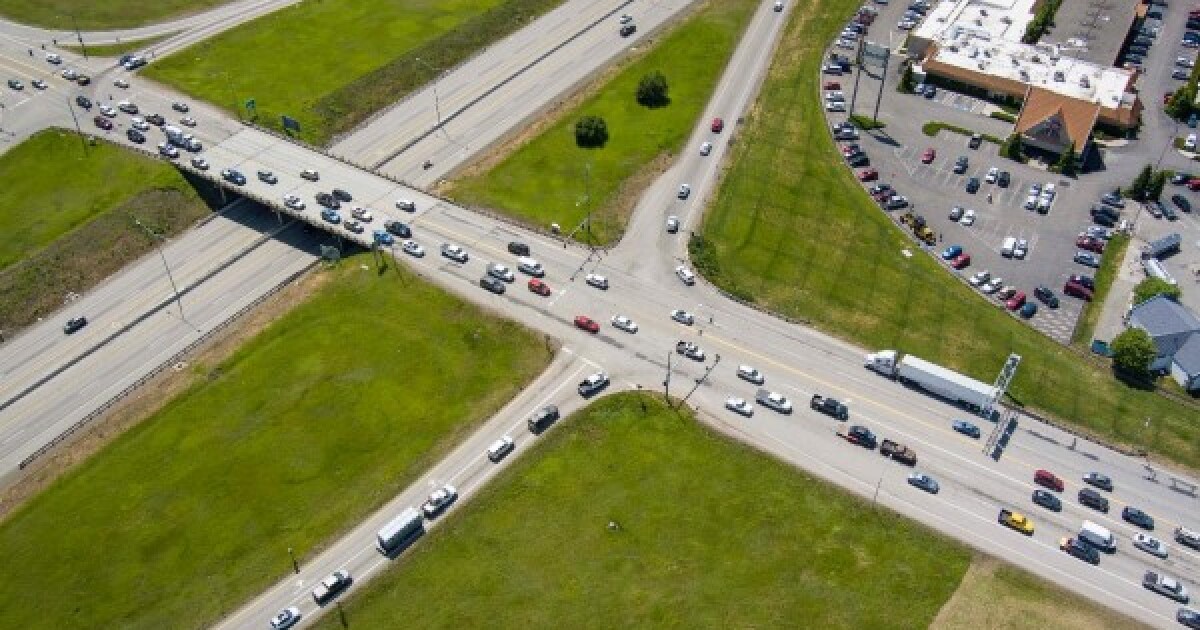Conspiracy theories slide into traffic planning discussions in Coeur d’Alene

A proposed traffic surveillance and study system in Coeur d’Alene has drawn opposition rooted in conspiracy theories.
The Kootenai Metropolitan Planning Organization (KMPO) is considering a regional traffic management center that would study traffic flow and congestion in real time, and coordinate response across jurisdictions. KMPO voted unanimously last September to commission a report that identifies needs and potential funding options for the traffic management center, or TMC. Spokane and Boise already have similar traffic systems, according to Damon Allen, an Idaho Transportation Department engineer who serves on the KMPO board.
A group called Stop Smart Cities in Idaho characterizes the TMC proposal as a backdoor way for government agencies to spy on the public and collect information. Their rhetoric ties the traffic management concept to a wider national and global conspiracy to keep tabs on Kootenai Countians, limit their movement and alter their DNA remotely.
In a video released this summer, an unidentified narrator counseled viewers to reject arguments that support the traffic center proposal.
“If [KMPO members] argue and they say, ‘Oh, the federal government is paying for it, it’ll increase safety, it’ll increase response time,’ we have to shoot all those down. Those are no good arguments,” the speaker said. “Anybody who buys into that is a globalist.”
The Stop Smart Cities website makes further unsubstantiated claims its authors say are connected to the traffic management proposal and the broader issue of “smart cities.” They include a plan to limit urban residents’ movements and to “close off” nearly a third of “all wilderness areas.” The site links smart cities to dark conspiracy theories that involve 5G wireless service, mRNA vaccines, LED lighting, and Facebook founder Mark Zuckerberg.
The speaker in the group’s video also introduced a partisan angle to the discussion. She encouraged Kootenai County residents to elect conservative allies to the Metropolitan Planning Organization to not only reject TMC proposals, but to stage a broader fight against federal highway funding, which the group claims is another conduit for surveillance technology.
“All pro-TMC politicians must be voted out. Everybody has to be pressured,” the speaker said. Later in the presentation she said, “Long term, we need to have…permanent conservative control of KMPO.”
The group has also delivered its message in person. One recent presentation at a Coeur d’Alene coffee house drew more than 100 people, according to the Coeur d’Alene Press.
Glenn Miles, KMPO’s director, said he understands mistrust in government. And he said general concerns about privacy and data security are legitimate. But what the anti-smart cities TMC opponents don’t understand, he said, is that the system being considered would be locally staffed and operated, and would not record and store what its cameras witness.
“They don’t do it for a variety of reasons,” Miles told Spokane Public Radio. “I would say the most important one is, they don’t need it. Because their job is to look and observe things in real time, not to look backward. And I know there’s some concern about storing the video, which is why TMCs don’t store the video.”
Rather, Miles said, TMC’s purpose is to coordinate features that already exist, such as traffic signals along busy routes, and to give traffic managers and emergency responders a better grip on problems such as accidents and road debris.
As an example, he mentioned U.S. 95, a heavily-used highway that passes through multiple jurisdictions, including Coeur d’Alene, Hayden, and unincorporated Kootenai County. Each uses different platforms and different technologies that “really don’t talk well together,” in Miles’ words. Implementing a unified system could help traffic flow become smoother.
Miles said all he can do is present the facts as determined by the report commissioned last September, and tell residents what the TMC will – and won’t – do. Linking national- and global-scale conspiracy theories to a local traffic management proposal makes that job harder, he said.
“When misinformation is out there, it’s very hard to effectively deal with it, because we can only speak what we know to be true, based on the studies,” Miles said. “And that’s what we’re going to do.”
If KMPO votes to jettison the TMC proposal, or if local governments refuse to implement it, transportation planners would have to find alternative ways to deal with Kootenai County’s congested roadways. Miles said the group could consider new options, weighing their costs, required staffing, time to implement, and effectiveness. Some people have suggested the best idea is to do nothing.
“I have been told several times that if we don’t do anything and the system just gets unbearable, then people will no longer move here,” Miles said. “But history has shown that that doesn’t seem to work. So things just get worse.”
Public comment on the traffic management plan is being accepted through August 4. Two simultaneous KMPO open houses aimed at explaining the proposal will be held August 3: One at the Coeur d’Alene Public Library, and one at Black Bay Depot in Post Falls. Both take place from 5:30 to 7:30 p.m.
Results from the public comment period will be shared with the KMPO at its August 10 meeting.
This article has been archived for your research. The original version from Spokane Public Radio can be found here.


